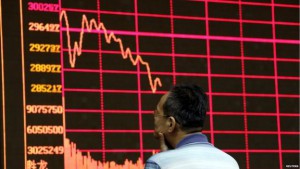Journalist `confesses` to causing China market chaos
 BEIJING: A financial journalist has “confessed” to causing “panic and disorder” on China`s stock market and inflicting “huge losses on the country”, state media reported on Sunday.
BEIJING: A financial journalist has “confessed” to causing “panic and disorder” on China`s stock market and inflicting “huge losses on the country”, state media reported on Sunday.
Wang Xiaolu, a journalist with Caijing magazine, was detained by Chinese authorities following China`s recent stock market crash.
Wang was held for fabricating and spreading fake information on securities and futures market, according to Xinhua, a state-run news agency.
According to the report, Wang “confessed” that his “false information” had “caused panics and disorder at [the] stock market, seriously undermined the market confidence, and inflicted huge losses on the country and investors”.
Wang wrote a story in July saying the securities regulator was studying plans for government funds to exit the market.The China Securities Regulatory Commission (CSRC) quickly denied the Caijing story, labelling it “irresponsible”.
But Caijing said it “defended journalists` rights to do their duty under the law”, according to a statement posted on its website.
Xinhua reported that authorities had also detained an official from China`s securities watchdog and four senior executives of the country`s major securities dealer for “stock market violations”.
Liu Shufan, an official with the CSRC was held on suspicion of insider dealings, taking bribes and forging official seals, said the report.Liu “confessed” that he has forged official seals to fake a court ruling on divorce and taxation certificates for his mistress.
Chinese state media regularly carries what it presents as confessions of suspects in high-profile cases. Formal arrest in China normally comes after some time in police detention, when the case is handed to prosecutors, with trial and conviction almost guaranteed.
The news agency also reported that 197 people have been punished in a special campaign by Chinese police targeting online rumours about China`s stock market, the recent fatal explosions in Tianjin and “other key events”.
No details of the punishments were given, but according to the report, the crimes punished included claiming a man had jumped to his death in Beijing due to the stock market slump, falsifying the number of people who had died in the Tianjin blasts, and circulating “seditious” rumours about China`s upcoming commemorations of the 70th anniversary of the end of World War II.

